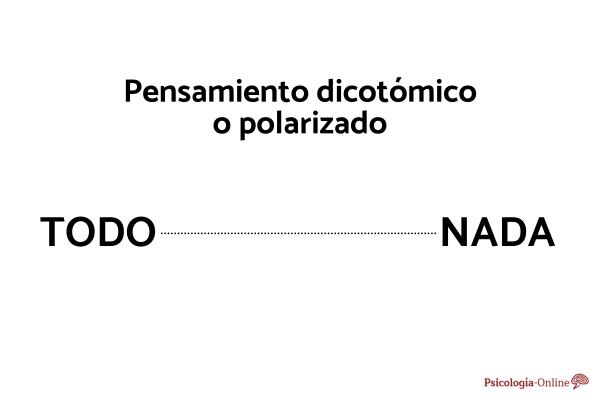Cognitive distortions prevent us from seeing things as they are, that is, they deform reality by focusing only on a certain aspect. These distortions manifest themselves as automatic thoughts and provoke in the subject a series of negative emotions that can lead them to have inappropriate or unwanted behaviors.
In this PsychologyOnline article, we are going to explain the definition and types of cognitive distortions.
Types of cognitive distortions
The distortions most common in people with low self-esteem are the following:
- Hypergeneralization: From an isolated fact, you make a general and universal rule. If you failed once, you will always fail.. Ex: “No one likes me; “Everyone dislikes me”; “I am nothing more than an uneducated fool (and others realize this)”…
- Global designation: you automatically use pejorative names to describe yourself, instead of accurately describing your qualities. Ex: failure, coward, clumsy, desperate, ugly, weak, stupid..
- Filtered out: you selectively pay attention to the negative and neglect the positive
- Polarized thinking: you take things to their extremes, you express them in black or white categories, without a middle ground. It has to be perfect or else it’s worthless. Ex: “You can’t do anything right” “You are totally disorganized. “Look at that table.”
- Self-accusation: You constantly blame yourself for things that cannot be your fault.
- Personalization: You assume everything has something to do with you and compare yourself negatively to everyone else. “Everyone is looking at you” “Look how Rosa is always well groomed, while I don’t know how to groom myself”
- Mind reading: You assume that other people don’t like you, don’t care about you, etc., without any real evidence that your assumptions are correct. Ex: “She thinks I am because I don’t give my opinion” “She is being nice to me, but inside she is thinking that I am an idiot.”
- Control fallacies: you feel that you have total responsibility for everything or everyone or you feel that you have no control over anything, that you are a helpless victim. “You are exhausted.” “You can’t beat them” “You never organize yourself.” “You are helpless” “You can’t do anything.”
- Emotional reasoning: you assume that things are the way you feel them. Ex: “I’m going to die”, “It’s horrible”, “I can’t stand it”, “All my friends are going to leave me”..
This article is merely informative, at PsychologyFor we do not have the power to make a diagnosis or recommend a treatment. We invite you to go to a psychologist to treat your particular case.
If you want to read more articles similar to Cognitive distortions: definition and types we recommend that you enter our Cognitive Psychology category.








